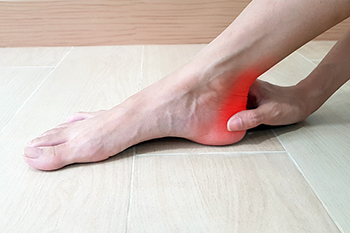

An Achilles tendon injury can cause extreme pain and discomfort. This tendon is located in the lower back of the leg, and connects the heel to the calf muscles. People who enjoy running may experience Achilles tendon injuries. This may be a result of increasing speed and mileage too quickly, and not warming up and cooling down properly before and after running. The pain is immediately felt when this type of injury has happened, and additional symptoms can include decreased strength, stiffness in the back of the heel, and it can be difficult to walk. A proper diagnosis is often done, which consists of having an X-ray, MRI, or ultrasound performed. This often begins with resting the affected foot as frequently as possible, and keeping the weight off of it. It may be beneficial to perform strength training exercises and stretches as it heals, in addition to wearing custom-made orthotics. If you have an Achilles tendon injury, it is strongly suggested that you are under the care of a podiatrist who can properly treat this condition.
Achilles tendon injuries need immediate attention to avoid future complications. If you have any concerns, contact Massimo Pietrantoni, DPM of Rochester Podiatry, LLP. Our doctor can provide the care you need to keep you pain-free and on your feet.
What Is the Achilles Tendon?
The Achilles tendon is a tendon that connects the lower leg muscles and calf to the heel of the foot. It is the strongest tendon in the human body and is essential for making movement possible. Because this tendon is such an integral part of the body, any injuries to it can create immense difficulties and should immediately be presented to a doctor.
What Are the Symptoms of an Achilles Tendon Injury?
There are various types of injuries that can affect the Achilles tendon. The two most common injuries are Achilles tendinitis and ruptures of the tendon.
Achilles Tendinitis Symptoms
Rupture Symptoms
Treatment and Prevention
Achilles tendon injuries are diagnosed by a thorough physical evaluation, which can include an MRI. Treatment involves rest, physical therapy, and in some cases, surgery. However, various preventative measures can be taken to avoid these injuries, such as:
If you have any questions please feel free to contact one of our offices located in Brighton and Greece of Rochester, NY . We offer the newest diagnostic tools and technology to treat your foot and ankle needs.